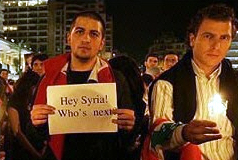By now we know that former Lebanese Prime Minister Rafiq Hariri was murdered on February 14th, that President Bush recalled the American ambassador to Syria while Secretary of State Condoleezza Rice led condemnation of Bashar Assad's Syria, implying that Damascus was responsible for the assassination. Rice also renewed charges of Syrian sedition in Iraq, something well-known and oft expressed over the months in Baghdad. President Bush followed the secretary's comments by announcing suspicion of Syrian fingerprints on Hariri's death, intolerance for Syria's wide and long-standing participation in terrorism, and a warning to Assad's totalitarian regime as blunt as that which the president delivered in his State of the Union address. Called "out of step" with the region's move towards democracy, Damascus' Ba'athists were left to reflect on the fate of Iraq's Ba'athists.
In Lebanon, the people wield their own outrage. A massive, anti-Syrian protest gobbled up Hariri's funeral procession. While Reuters was reminded of the Lebanese Civil War (instigated by, among other factors, Yasser Arafat's terrorist cabal), one might be inspired to look back to Lebanon's brief post-Franco liberalism.
Following unprecedented public protest against Syrian captivity, an arm of Beirut's marionette parliament has turned to cut itself from Damascus:
Pressure on Syria to pull out of Lebanon intensified Friday when nearly a third of MPs called on the pro-Damascus regime in Beirut to step down and make way for an interim government to oversee a withdrawal.More than 40 of parliament's 128 deputies and dozens of opposition activists called on their fellow citizens to join a "democratic and peaceful uprising for independence in response to the criminal and terrorist policy of the Lebanese and Syrian authorities."
Will the memory of Rafiq Hariri guide Lebanese independence towards democracy? If the people fight for his legacy, Fouad Ajami believes so, marking it as a departure:
There is talk nowadays of spreading liberty to Arab lands, changing the ways of the Arabs, putting an end to regimes that harbor terror. The restoration of Lebanon's sovereignty ought to be one way for the Arabs to break with the culture of dictators and police states, and with the time of the car bombs. Hariri sought for his country a businessman's peace. His way was a break with the politics of charisma and ideology that has wrecked the Arab world; he believed in philanthropy and practical work. His vision may not have been stirring. But there was dignity in it, and a reprieve from the time of darkness.
Common sense bests profundity.
